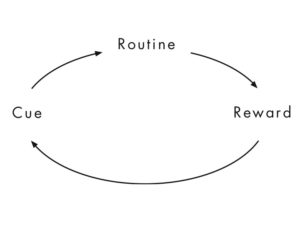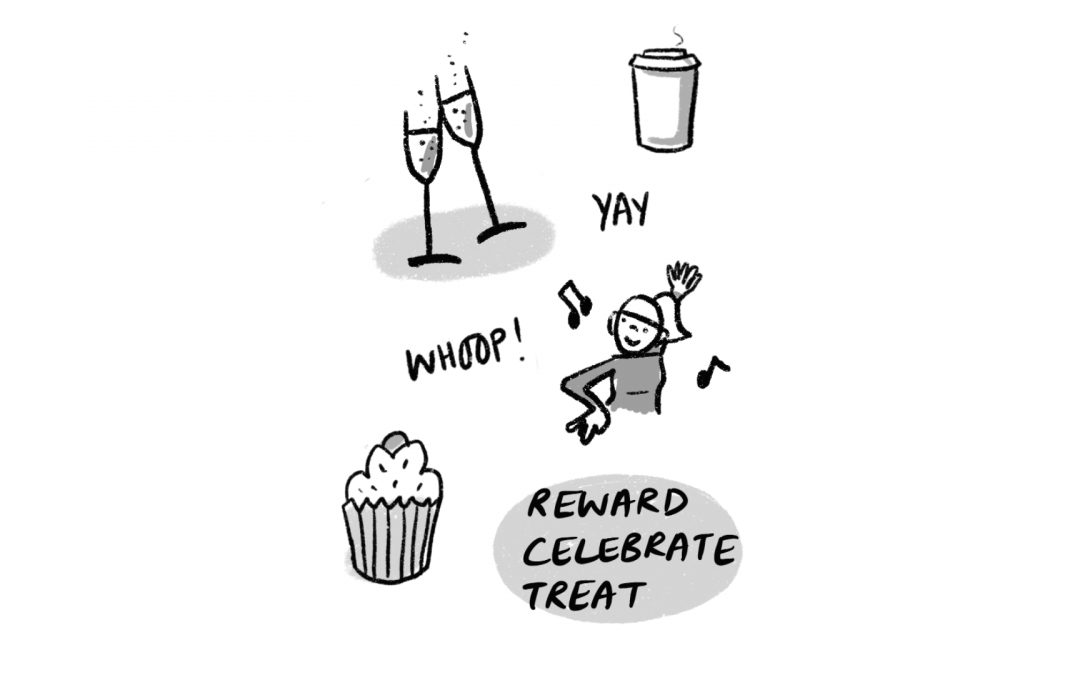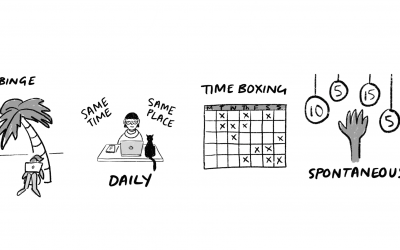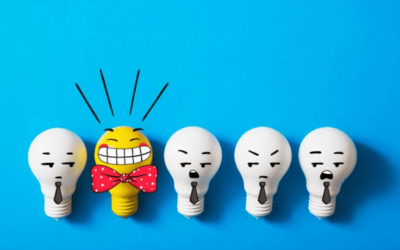Whatever you’re writing it’s important to keep motivated and keep moving forward. That’s when rewards can power up your writing productivity. However, there’s more to rewards than treating yourself to a big slice of cake after crafting the perfect sentence. Find out how you can tap into the habit loop with immediate celebrations, treat yourself to keep motivated, and build in big incentives to help you finish your writing project.
When I was writing my first book I needed all the help I could get to keep going.
To counter the physical, mental and creative exhaustion I planned in lots of treats to keep motivated. Each day after finishing my early-morning writing session I made myself a nice cup of coffee as I headed to work, every couple of weeks I’d schedule a celebration with friends for afternoon cake or an evening cocktail, and I booked myself a holiday for the week after my submission deadline.
Rewards to motivate your writing
My principle was to reward the effort I put in – a small daily treat, a regular celebration of milestones, and a big incentive to recognise the achievement of a long-held goal. All of these rewards gave me great pleasure and enjoyment. In turn, that made the process of writing more bearable and made it far more likely that I would keep going when I hit blocks.
When working on a difficult project, changing your behaviour or building a routine it’s important to focus on positive feelings. Social science researcher BJ Fogg, the founder and director of the Stanford Behavior Design Lab, says: “People change best by feeling good, not by feeling bad.”
>> Read more: How small steps lead to great progress
That’s what I was doing with my rewards – finding something positive to focus on while I endured the effort of writing.
However, there’s a big difference between the pleasure I got from my writing rewards and the reward centre of the brain that’s involved in habit formation. Understanding this difference will help you design a rewards system that supports your writing.
Rewards and the habit loop
Author Charles Duhigg referred to the habit loop as “a framework for understanding how habits work and a guide to experimenting with how they might change.” It applies to all areas of your life and can be used to break bad habits encourage new ones.
It’s a simple neurological loop at the core of every habit and comprises three elements: the cue, the routine and reward.
- The cue sets up the routine. It’s a trigger to action – sometimes prompting behaviours you want to do, such a brushing your teeth, and other times triggering unwanted behaviours. For example, the tobacco, gambling and fast food sectors are masters at manipulating cues.
- The routine is the behaviour – again, it can be wanted or unwanted, the point being it follows the cue automatically.
- The reward embeds a routine. It taps into the reward circuitry of the brain to associate something pleasurable with the behaviour as you complete the first loop, making more likely you will re-do the loop in the future. As such, it is seen as a reinforcer that increases the probability the behaviour will happen again.
 In behavioural science rewards have a very specific function and conform to a set of criteria. Take timing. For the habit loop to work effectively, the reward must be delivered either during the routine or milliseconds afterwards – pretty much instantly.
In behavioural science rewards have a very specific function and conform to a set of criteria. Take timing. For the habit loop to work effectively, the reward must be delivered either during the routine or milliseconds afterwards – pretty much instantly.
It’s all down to neuroscience. The action takes place in the reward centre of the brain where dopamine is released, processed, and new neural pathways are formed that will embed the habit.
>> Read more: How to trigger your writing habit
Let’s go back to the coffee I use to ‘reward’ myself after a writing session. While it is thoroughly enjoyable (note: I make an excellent coffee) it is not a habit-inducing, neural pathway creating, brain-boosting reward. That’s because there is too large a gap between the routine of writing and the drinking of coffee to trigger dopamine and create a neural link between the two.
The coffee is a treat, which acts an incentive, not as a reward.
That’s not to say that incentives aren’t helpful – they are, and we’ll explore them later. But first, let’s make use of the neuroscience to find out how to create an instant reward.
How to create rewards using celebrations
We now have a far narrower definition of rewards and a smaller opportunity to build a habit in the classic sense. However, that precision gives us clarity on how to do it and, therefore, a greater chance of success.
BJ Fogg of the Stanford Behavior Design Lab, proposes using celebrations. “Your brain,” he says, “has a built in system for encoding new habits, and by celebrating you can hack the system. When you find a celebration that works for you, and you do it immediately after a new behaviour, your brain repatterns to make that behaviour more automatic in the future.”
“When you find a celebration that works for you, and you do it immediately after a new behaviour, your brain repatterns to make that behaviour more automatic in the future.” BJ Fogg
The celebration has to be immediate. It also needs to feel authentic to you and have enough intensity to trigger the dopamine. You can’t fake a celebration – your brain will know you are lying.
How to find a celebration
It can be hard to find a celebration that works for you. It is, after all, deeply personal and also dependent on your culture. For example, as a rather introverted, self-critical, buttoned up Brit, celebration does not come naturally to me. My friends on the other side of the pond, find it completely appropriate to leap in the air and fist pump their successes.
BJ Fogg has a list of one hundred ways to celebrate in his book Tiny Habits, here’s a few suggestions you could do the second you’ve completed a writing session:
- Say something positive, for example ‘Yes!’ ‘Yay!’ ‘Awesome.’
- Hum an upbeat song, think of a positive affirmation like ‘I got this.’
- Move, clap your hands, nod your head, snap your fingers, do a dance.
- Imagine fireworks going off, confetti falling around you, champagne corks popping.
- Combine movement with words or music – out loud or imagined.
Struggling to celebrate?
If you’re struggling to think of a celebration, put yourself in a scenario where you might spontaneously celebrate. What would you do when you watch your sports team win, when you get an amazing job offer, when you type the words ‘the end’ as you complete a long writing project? Imagine your reaction and use that.
>> Read more: How small steps lead to great progress
To build a habit using the reward circuitry of the brain, you need to choose a celebration, start doing it when you complete your routine, and be consistent. However, you don’t need to keep doing it. After time the habit loop will become automatic, so the celebration becomes optional.
“But once you have created a habit, celebration is now optional. You don’t need to keep celebrating the same habit forever.” BJ Fogg
Incentives – using treats to reward your writing
There is some debate whether writing can ever become a habit. It’s hard. It takes time, effort, willpower – you have to be organised, motivated, determined.
The rewards in writing are distant, many months or years away. Writing doesn’t give you the dopamine high of instant gratification in the way online gaming does. Many writers find writing painful – and while many are masochists, something is driving them to continue.
One of the keys to successful behaviour change – the kind of effort required when working on a writing project – is to make it pleasurable. That’s where incentives come in.
Dictionary.com defines incentives as “something that incites or tends to incite to action or greater effort, as a reward offered for increased productivity.”
Incentives are treats. In some ways they are closer to bribes that give you something to look forward to, a reward for your effort, a pleasure to associate with writing.
>> Read more: Writing systems: finding yours, why it matters
The strategy of treats
Happiness and Habits author Gretchen Rubin identified the strategy of treats, she said:
“Treats may sound like a self-indulgent, frivolous strategy, but it’s not. Because forming good habits can be draining, treats can play an important role. When we give ourselves treats, we feel energized, cared for, and contented, which boosts our self-command—and self-command helps us maintain our healthy habits.”
She warns that if we don’t treat ourselves, we begin to feel burned-out, depleted, and resentful. We want to avoid feeling like that at all costs.
“Because forming good habits can be draining, treats can play an important role. When we give ourselves treats, we feel energized, cared for, and contented, which boosts our self-command—and self-command helps us maintain our healthy habits.” Gretchen Rubin
It’s time to treat yourself. Follow our top tips to find your perfect writing incentive.
6 ways to create the perfect writing incentive
1. Power-up the effort, not the outcome
The amount of effort you put into writing can’t always be measured by word count. Sometimes writing in short energetic bursts can move your work on in leaps and bounds. Other days you spend hours and barely produce a workable paragraph.
So, reward the effort you put in, not the outcome.
2. Make the reward fit the achievement
It’s important to make the reward proportionate. Don’t promise yourself champagne every time you write when a coffee will do. We believe there are four different levels of incentive that will power-up your writing.
- Warm glow: Get glowing with an instant celebration – a small movement, phrase, affirmation or humming a tune to make you feel pumped.
- Fist bump: When you’ve just had a good writing session and feel pleased. Treat yourself with something inexpensive like a cuppa.
- Woo-hoo: Reserve this power-up for when you’ve hit a milestone in your writing, a celebratory cake or drink.
- Party on!: You deserve a bigger reward when you’ve smashed your goal in full. Book that holiday like I did and get a week of rest.
3. Goldilocks your incentive
It’s important to incentivise yourself – but not too much or too little – and do it at the right stage. If your reward is too small then you’ll lose motivation with your project.
However, if your reward is too big and grand then it all becomes about getting the prize rather than what you need to do to get there. You need to channel your inner Goldilocks and get it just right.
4. Personalise your power-up
There’s no such thing as a universal reward – one person’s treat is another’s trick – so think about what will motivate you. And have fun experimenting.
5. Turn your procrastination into power ups
We find that many writers struggle to come up with rewards. If that’s you, here’s a tip.
Think of the activities you do instead of writing, the little things that distract you and make you procrastinate. My guilty pleasure is Instagram. So rather than scrolling at the start of my writing session I save it for a break (it’s perfect during Pomodoros).
6. Punish yourself!
If pleasure isn’t the thing to get you writing, then perhaps you need some pain.
Behavioural scientists have found that ‘loss aversion’ to be a more powerful motivator than the promise of gains. In short, many of us would rather not lose something than gain something.
If you want to tap into this powerful force for action, then try StickK a website set up by behavioural economists where you place a wager to complete a goal. How about Write or Die which deletes your words if you pause.
In summary: how to keep writing using rewards
Rewards are a powerful tool in building habits, because they:
- create neural pathways to make routines more automatic
- associate pleasure with writing which will keep us motivated long term
- provide treats to get us started
- act as an incentive to keep us writing
- and help us acknowledge milestones and celebrate our progress.
Originally published on 8 June 2020, update June 2021.




